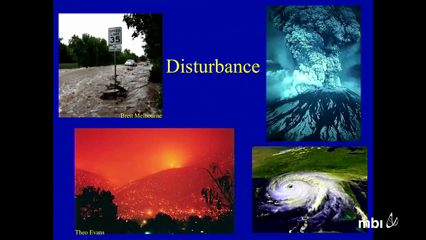MBI Videos
Katriona Shea
-
 Katriona Shea
Katriona SheaDisturbances are ubiquitous in nature, and are believed to be strong drivers of both ecological diversity and species invasion. The need to address the impacts of environmental disturbance is increasingly urgent in the face of anthropogenic alterations to existing disturbance regimes. I will discuss how an ecological niche-based theory of disturbance, encompassing five interacting aspects (frequency, intensity, duration, extent and timing), can be used to study a wide range of issues related to disturbance regimes and their effects on biological systems. This conceptual framework allows an integrated study of disturbance across levels of biological organization: from the individual through to the population, the community and entire ecosystems. Ongoing theoretical and empirical research not only informs us about when disturbances are likely to pose a problem, but also lets us assess how we can manipulate disturbances to achieve desired management outcomes. As disturbances of many types are increasingly used to manage ecosystems, this approach therefore can be applied to a wide range of management issues. Managers and policy makers need to be able to make reliable predictions — only if we can anticipate them, can we avoid or ameliorate the impacts of such disturbances.
